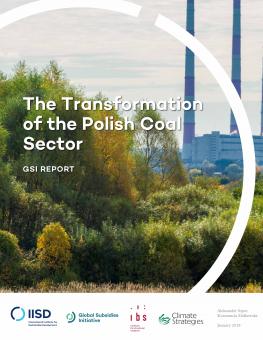
The Transformation of the Polish Coal Sector
Although Poland remains one of the most coal-dependent economies in Europe, there have been significant job losses in mining since 1990 This study reviews some of the policies introduced to mitigate the effects of these losses.
Poland has a strong tradition of coal mining and coal fired power.
Coal was the basis of the country’s industrialization, and today coal fired power still accounts for over 80 per cent of total electricity generation. With a large part of this coal coming from domestic sources, continued use of coal is often viewed as an important strategy in maintaining both energy independence and security. Aside from economics, the strength of the coal unions in Poland, and government ownership interests in both coal mining and the power sector, mean that the industry is central to both political and social discourse.
In spite of these factors, coal mining in Poland has witnessed a massive decline in employment from almost 400,000 miners in 1990 to around 100,000 miners in 2014. Prompted by the economic and social reforms associated with the fall of Communism, these job losses were largely a result of efficiency improvements.
This study considers the policies and strategies that were adopted to help manage the decline in employment.In particular, it focuses on two measures: the Mining Social Package and Special Privileges for Mining Communes. It assesses the success of each of these policies in mitigating the adverse social and economic impacts of the decline of the industry and considers their relevance to the challenges of coal phase out today.
You might also be interested in
The Cost of Fossil Fuel Reliance
Government support for fossil fuels reached at least USD 1.5 trillion in 2023, new data shows.
Increased Support Needed to Achieve India's Clean Energy Goals
India is on track to achieve many of its 2030 clean energy goals but needs to step up government support measures to accelerate the deployment of offshore wind, electric vehicles, and green hydrogen, according to a new report.
Ending Export Credits for Oil and Gas: How OECD countries can end 2024 with a climate win
For a year now, Organisation of Petroleum Exporting Countries (OECD) governments have been negotiating an agreement that could put an end to oil and gas export finance. Following the acrimony in Baku, this would be a very real way for the OECD to show policy coherence, respond to calls from the poorest countries to stop subsidizing fossil fuels, and shift public finance to solutions.
Fossil Fuel Production, Renewable Energy, and Subsidy Reform in Nationally Determined Contributions 3.0
This policy brief provides an analysis of the critical benchmarks and recommendations necessary for aligning nationally determined contributions (NDCs) with the 1.5 °C target.